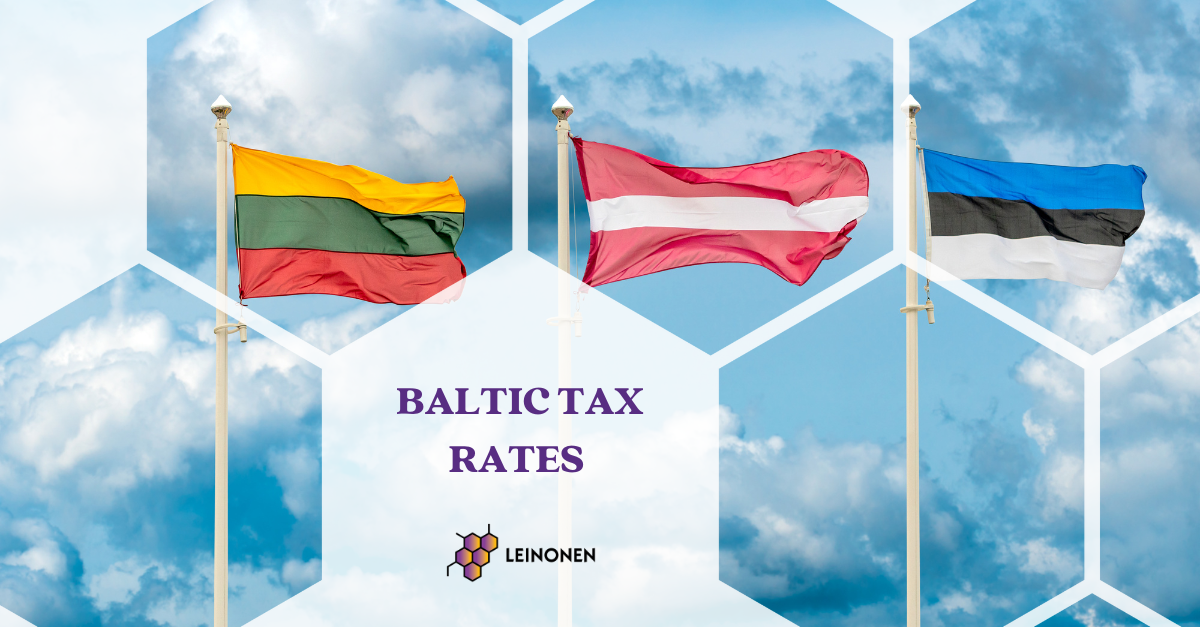| Estonia | Latvia | Lithuania | |
| Corporate income tax (CIT) rate | CIT is payable upon profit distributions (the deemed profit distribution). CIT rate is 20%, calculated as 20/80 from taxable net payment. Regularly paid dividends are subject to a reduced rate of 14% (14/86 from net dividends). | CIT is payable upon profit distributions (the deemed profit distribution). CIT rate is 20%, calculated as 20/80 from taxable net payment. | CIT is calculated as follows: Total income – non-taxable income – allowed deductions – limited deductions = taxable profit. Standard CIT rate is 15%. 20% CIT rate is applicable to credit institutions. 0% and 5% rates may be applied under certain conditions. |
| Withholding tax rates: | |||
| Dividends | 20% or 14%1 | 0% or 20%/10%, reduced rates may be applied according to DTT | 0% or 15%, reduced rates may be applied according to Double Treaty Taxation (DTT) |
| Interest | 20% to residents or N/A for non-residents | 0% or 20%/10%, reduced rates may be applied according to DTT | 0% or 10% |
| Royalties | 20% to residents, 10% to non-residents or N/A, in case the exemption applies | N/A | 0% or 10% |
| Management/ consulting fee | 20%, exemption may be applied according to DTT | 20%, exemption may be applied according to DTT | N/A |
| alienation of immovable property | 20% | 3% | 15% |
| Rent/lease of real estate income | 20% | 5% | 15% |
| Service fees payable to non-residents from non-cooperative tax jurisdictions | 20% | 20% | Payments made by a Lithuanian company for services to foreign companies registered or otherwise organised in target territories are considered to be non-allowable deductions where the paying Lithuanian company does not supply to the local tax administrator evidence that: 1) such payments are related to the usual activities of the paying and receiving entity; 2) the receiving foreign entity controls the assets needed to perform such usual activities; 3) there is a link between the payment and the economically feasible operation. |
| Wage taxes: | |||
| Minimum monthly salary | EUR 820 | EUR 700 | EUR 924 |
| PIT rates | 20%; Monthly basic exemption – EUR 6542. | 20% rate on annual income up to EUR 20,004; 23% rate on annual income exceeding EUR 20,004 31% rate on annual income exceeding EUR 78,100 | 20% rate on annual income;32% rate on annual income. |
| Social security tax rates: | |||
| Employee rate | 1,6% unemployment insurance premium; 2% funded pension contribution (if the person has joined 2nd pillar); | 10.50% | Employee’s social security contributions – 19,5%, Participation of employee in pension scheme (optional): 3%. |
| Employer rate | 33% social tax (the minimum monthly obligation for social tax is EUR 725, it means, for an employer, the minimum obligation for social tax is EUR 239,25 monthly); 0,8% unemployment insurance premium. | 23.59% | 1.77-2.49 % |
| Solidarity tax | N/A | 25 % from income exceeding EUR 78,100 | The solidarity contribution is payable by the banks and credit unions on the surplus of the interest received in 2023 and 2024 from the Lithuanian residents’ loans. The tax base of the solidarity contribution is 50 % of the net interest income (interest income minus interest expenses) which exceeds the average net interest income of the previous 4 years (i.e. 2018 – 2021 for 2023 and 2019 – 2022 for 2024). The contribution is levied at a rate of 60 %. |
| Value added tax | |||
| Value added tax rates | 22%, 9% and 0% | 21%, 12% and 5% | 21%, 9% 5% and 0%. |
| VAT registration thresholds | EUR 40,000 | EUR 50,000 | EUR 45,000 |
| Annual EU distance selling threshold | EUR 10,000 for the sales all around EU | ||
| Intrastat reporting | |||
| Arrivals | EUR 400,000 | EUR 330,000 | EUR 550,000 |
| Dispatches | EUR 200,000 | EUR 200,000 | EUR 400,000 |
[1] Regularly paid dividends are subject to a discount rate of 14/86. Please note: if the payment is made to a private person, income tax of 7% is charged on dividends. NB From 2025 a discount rate of 14/86 regularly paid dividends can no longer be used.
The income tax withheld can be 5% or 0% (depending on the tax agreement) in the case of a non-resident shareholder.
[2] The annual basic exemption is up to EUR 7,848 (EUR 654 per month). Basic exemption at pensionable age is EUR 9,312 per year (EUR 776 per month).
For more questions specific to individual countries, please contact the appropriate country’s office:
| Tallinn, Estonia Leinonen OÜ Põhja pst. 25 10415 + 372 6117 700 contact@leinonen.ee | Riga, Latvia Leinonen SIA Vilandes iela 3 LV-1010 + 371 6732 3901 contact@leinonen.lv | Vilnius, Lithuania Leinonen UAB Vilnius, Gerulaicio str. 10- 101 08200 + 370 6101 5057 contact@leinonen.lt |





